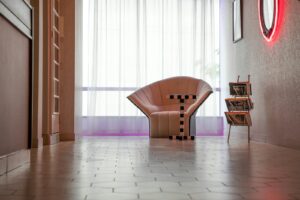To prevent mold and mildew on vinyl flooring, regularly clean and dry the surface, control humidity levels, use proper ventilation, and address water leaks promptly. These proactive measures will help maintain the integrity of your vinyl flooring and promote a healthier indoor environment.
Mold and mildew, being types of fungi, can thrive in the porous and damp nature of vinyl flooring. Despite vinyl’s resistance to mold, the combination of organic matter, dirt, and moisture can create an environment conducive to their growth, leading to discoloration and potential damage. 2. Vinyl flooring’s susceptibility to mold underscores the importance of understanding how these organisms develop and the necessity of proactive prevention.
Leaks from appliances, plumbing, or roofs introduce excess water, a primary catalyst for mold and mildew. Identifying and promptly addressing these leaks is crucial to prevent moisture accumulation.
Spaces with inadequate ventilation, such as basements and bathrooms, often experience higher humidity levels, providing an additional breeding ground for mold. Recognizing these common sources helps homeowners implement targeted prevention strategies.
Cleaning and Maintenance
Consistent cleaning plays a pivotal role in preventing the accumulation of dirt and debris on vinyl flooring, as these particles can trap moisture and foster mold growth.
Vacuuming or sweeping regularly not only removes loose dirt but also ensures a clean surface, reducing the risk of mold development.
Choosing the Right Cleaning Products
Opting for mild, pH-neutral cleaners specifically formulated for vinyl flooring is paramount. Harsh chemicals can compromise the material’s integrity, emphasizing the need for gentle cleaning solutions.
Homeowners should be educated on the importance of avoiding abrasive cleaners and excessive water usage, as these can cause irreparable damage to the vinyl surface.
Luxury Vinyl Plank (LVP)
| Product Type | Description | Usage Tips |
|---|---|---|
| pH-Neutral Cleaners | Mild cleaners suitable for luxury vinyl plank flooring. | Avoid wax-based cleaners; use a damp mop for regular cleaning. |
| Vinyl Floor Cleaner | Specific cleaners designed for luxury vinyl plank surfaces. | Follow the manufacturer’s recommendations for application and frequency. |
| Rubber Broom | Brooms with rubber bristles for effective dirt and dust removal. | Regularly sweep the floor to prevent debris buildup. |
Sheet Vinyl Flooring
| Product Type | Description | Usage Tips |
|---|---|---|
| Mild Detergents | Gentle detergents suitable for sheet vinyl flooring. | Dilute detergent according to instructions; avoid harsh chemicals. |
| Soft Bristle Broom | Brooms with soft bristles to prevent scratches on sheet vinyl. | Sweep regularly to remove loose dirt and prevent abrasions. |
| Vinyl Floor Polish | Specialized polish for restoring shine to sheet vinyl surfaces. | Use polish sparingly and follow the recommended application procedure. |
Vinyl Tile Flooring
| Product Type | Description | Usage Tips |
|---|---|---|
| Gentle Cleaning Solutions | Mild solutions suitable for cleaning vinyl tile flooring. | Avoid abrasive cleaners to prevent damage to tile surfaces. |
| Vinyl Tile Grout Cleaner | Specific cleaners for maintaining cleanliness in grouted areas. | Clean grout lines regularly to prevent discoloration and mold growth. |
| Soft Microfiber Mop | Mops with soft microfiber material for efficient and gentle cleaning. | Mop the floor in the direction of the tiles for optimal cleaning. |
Controlling Humidity Levels
High humidity significantly contributes to mold and mildew growth by creating an environment conducive to their development. Homeowners should understand the correlation between humidity levels and the potential for flooring issues.
Establishing the optimal humidity range for vinyl flooring, typically between 30% and 50%, is essential for preventing the onset of mold and mildew.
Dehumidifiers prove effective in reducing excess moisture, helping maintain the ideal humidity levels for vinyl flooring. Strategic placement in areas prone to high humidity, such as basements, enhances their efficiency.
| Model | Capacity | Coverage Area | Noise Level | Features |
|---|---|---|---|---|
| DehuMaster 2000 | 70 pints/day | Up to 1,500 sq. ft. | 45 dB | Adjustable Humidistat, Auto Defrost, Timer |
| ClimateControl 3000 | 50 pints/day | Up to 1,200 sq. ft. | 50 dB | Energy Star Certified, Continuous Drain Option |
| PureDry Deluxe | 30 pints/day | Up to 500 sq. ft. | 35 dB | Auto Shut-Off, Washable Filter |
| AirMega Pro | 90 pints/day | Up to 2,000 sq. ft. | 55 dB | WiFi Connectivity, Smart Mode, HEPA Filter |
| WhisperDry 5000 | 65 pints/day | Up to 1,800 sq. ft. | 40 dB | Low Temperature Operation, Digital Display |
| CompactDry Mini | 20 pints/day | Up to 300 sq. ft. | 30 dB | Compact Design, Portable, Energy Efficient |
Enhancing ventilation through the use of exhaust fans, open windows, or air circulators contributes to minimizing indoor humidity levels.
Recommending moisture-absorbing products, such as silica gel packets, provide an additional layer of defense against moisture accumulation in confined spaces.
Proper Ventilation
Proper ventilation serves as a fundamental preventive measure by expelling humid air and replacing it with drier air, reducing the risk of mold and mildew growth. 2. Emphasizing the role of ventilation in creating a healthier indoor environment underscores its significance in preserving the quality of vinyl flooring.
Installing and maintaining exhaust fans in areas with elevated humidity, such as kitchens and bathrooms, aids in controlling moisture levels.
Exhaust fans play a pivotal role in removing moisture-laden air, preventing it from settling on surfaces like vinyl flooring. Regular cleaning and maintenance of these fans ensure their optimal functionality. 2. Guiding the proper use and maintenance of exhaust fans empowers homeowners to take an active role in moisture control.
Read More
Vinyl Flooring for Bathrooms and Kitchens
How to Waterproof Vinyl Flooring
Underlayment for Vinyl Plank Flooring on Concrete, Plywood and Hardwood




